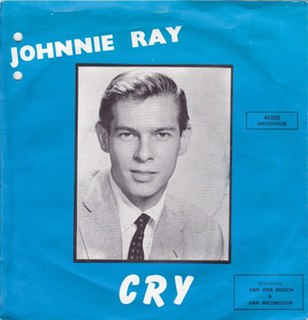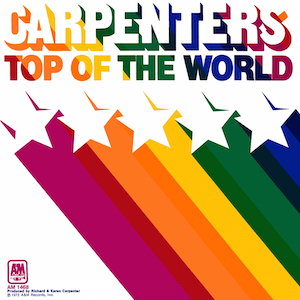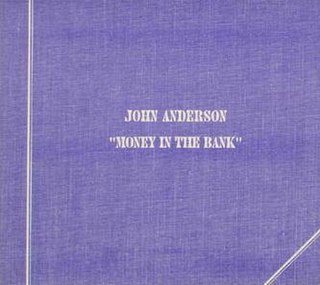Related Research Articles

"Still the One" is a song written by Johanna Hall and John Hall, and recorded by the soft rock group Orleans on their album Waking and Dreaming, released in 1976, which made it to No. 5 on the Billboard Hot 100.

"Cry" is the title of a 1951 popular song written by Churchill Kohlman. The song was first recorded by Ruth Casey on the Cadillac label. The biggest hit version was recorded in New York City by Johnnie Ray and The Four Lads on October 16, 1951. Singer Ronnie Dove also had a big hit with the song in 1966.

"Top of the World" is a 1972 song written and composed by Richard Carpenter and John Bettis and first recorded by American pop duo Carpenters. It was a Billboard Hot 100 No. 1 hit for the duo for two consecutive weeks in 1973.

"Lost in This Moment" is a song written by John Rich, Keith Anderson and Rodney Clawson, and recorded by American country music duo Big & Rich. It was released in February 2007 as the first single from their album Between Raising Hell and Amazing Grace. The single became their first and only Number One hit on the Billboard country charts in mid-2007. Prior to its release, the duo's highest-charting single was "Save a Horse ", which reached #11.
"City Lights" is an American country music song written by Bill Anderson on August 27, 1957. He recorded it on a small Texas label called TNT Records in early 1958 to little acclaim. The song was first cut by Anderson in 1957 at the campus of the University of Georgia. In June 1958, Ray Price recorded it and his version hit number 1 on the Billboard Hot Country Songs singles chart in August 1958. Mickey Gilley's version also hit number 1 in June 1975.

"My Second Home" is a song co-written and recorded by American country music singer Tracy Lawrence. It was released on September 16, 1993, as the third single from his album, Alibis. The song reached the top of the Billboard Hot Country Singles & Tracks chart and peaked at number 6 on the Canadian RPM Country Tracks chart. It was written by Lawrence with Paul Nelson and Kenny Beard.
"Straight Tequila Night" is a song written by Debbie Hupp and Kent Robbins, and recorded by American country music singer John Anderson. It was released on December 2, 1991, as the first single from Anderson's album Seminole Wind. It reached number-one on the country charts in the United States and Canada. It was Anderson's first number one song since 1983 and considered his comeback single.

"Swingin'" is a song co-written and recorded by American country music singer John Anderson. It was released in January 1983 as the second single from his album Wild & Blue. The song was the second of five number one singles in Anderson's career, spending one week at the top of the Hot Country Songs charts. It also received a gold certification from the Recording Industry Association of America, and received a Single of the Year award from the Country Music Association. Anderson re-recorded the song for his 1994 album Country 'til I Die on BNA Records. This re-recording served as the b-side to the album's title track, which was also the first single from it. In addition to LeAnn Rimes, Chris Young performed an acoustic cover of "Swingin'" for his 2010 EP Voices.

"Money in the Bank" is a song written by Bob DiPiero, John Jarrard and Mark D. Sanders, and recorded by American country music artist John Anderson. It was released in April 1993 as the lead-off single from his album Solid Ground. It peaked at number one on the United States Billboard Hot Country Singles & Tracks chart, and number one on the Canadian RPM Country Tracks chart. It is his last number one hit to date.
"Black Sheep" is a song written by Danny Darst and Robert Altman, and recorded by American country music artist John Anderson. It was released in September 1983 as the first single from the album All the People Are Talkin'. The song was Anderson's third number one on the country chart. "Black Sheep" went to number one for one week and spent a total of 14 weeks within the top 40.
"I've Got It Made" is a song written by Max D. Barnes, and recorded by American country music artist John Anderson. It was released in November 1993 as the third single from his album Solid Ground. The song reached number 3 on the Billboard Hot Country Singles & Tracks chart and number 19 on the Canadian RPM Country Tracks chart.

"Let Go of the Stone" is a song written by Max D. Barnes and Max T. Barnes, and recorded by American country music artist John Anderson. It was released in November 1992 as the fifth single from his album Seminole Wind. The song reached number 7 on the Billboard Hot Country Singles & Tracks chart in 1993.
"Chicken Truck" is a song co-written and recorded by American country music artist John Anderson. It was released in August 1981 as the second single from album John Anderson 2. The song reached number 8 on the Billboard Hot Country Singles & Tracks chart. The song's b-side, "I Love You a Thousand Ways", charted at number 54 in the U.S. and number 11 in Canada. Anderson wrote the song with Monroe Fields and Ervan James Parker.
"Would You Catch a Falling Star" is a song written by Bobby Braddock, and recorded by American country music artist John Anderson. It was released in April 1982 as the second single from the album I Just Came Home to Count the Memories. The song reached number 6 on the Billboard Hot Country Singles & Tracks chart.
"Let Somebody Else Drive" is a song written by Merle Kilgore and Mack Vickery, and recorded by American country music artist John Anderson. It was released in January 1984 as the second single from the album All the People Are Talkin'. The song reached number 10 on the Billboard Hot Country Singles & Tracks chart.
"Honky Tonk Crowd" is a song written by Larry Cordle and Lionel Delmore, and recorded by American country music artist John Anderson. It was released in August 1986 as the first single from the album Countrified. The song reached number 10 on the Billboard Hot Country Singles & Tracks chart. It was his last Top 10 hit on that chart until "Straight Tequila Night" in late 1991-early 1992.
"Mississippi Moon" is a song written by Tony Joe White and Carson Whitsett, and recorded by American country music artist John Anderson. It was released in April 1995 as the third and final single from his album Country 'til I Die. The song reached number 15 on the U.S. Billboard Hot Country Singles & Tracks chart and number 11 on the Canadian RPM Country Tracks chart.
"I Fell in the Water" is a song written by Jerry Salley and Jeff Stevens, and recorded by American country music artist John Anderson. It was released in August 1993 as the second single from his album Solid Ground. The song reached number 13 on the Billboard Hot Country Singles & Tracks chart in November 1993.
"She Just Started Liking Cheatin' Songs" is a song written by Kent Robbins and recorded by American country music artist John Anderson. It was released in March 1980 as the third single from the album John Anderson. The song reached #13 on the Billboard Hot Country Singles & Tracks chart.
"Your Lying Blue Eyes" is a song written by Ken McDuffie, and recorded by American country music artist John Anderson. It was released in October 1979 as the third single from the album John Anderson. The song reached #15 on the Billboard Hot Country Singles & Tracks chart.
References
- 1 2 Whitburn, Joel (2008). Hot Country Songs 1944 to 2008. Record Research, Inc. pp. 26–27. ISBN 978-0-89820-177-2.
- ↑ "John Anderson Chart History (Hot Country Songs)". Billboard.